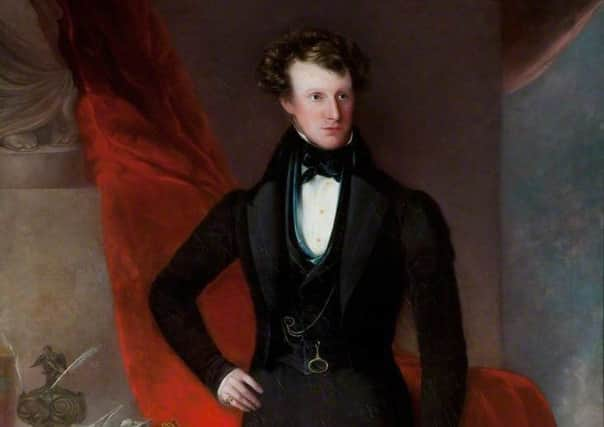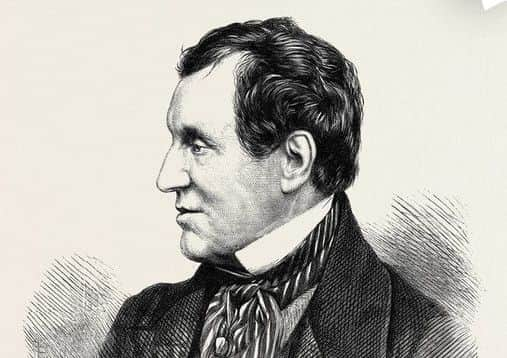James Emerson Tennent: A figure of real political substance and an advocate of civic unionism


Three facts underscore the fact that James Emerson Tennent, one of Belfast’s two MPs between 1832 and 1852 (and very briefly MP for Lisburn in 1852), was no ordinary run-of-the-mill MP.
The Oxford English Dictionary credits him with the first use of the term ‘rogue elephant’, a translation of the Sinhala term ‘hora aliya’. In 1865 his friend Charles Dickens dedicated his last completed novel – ‘Our Mutual Friend’ – to him. Other friendships constitute a veritable who’s who of 19th-century literature and include Lord Byron, James Leigh Hunt, John Forster (Dickens’ biographer) Charles Kingsley, Anthony Trollope, William Thackeray and Samuel Ferguson. He also had the unusual distinction of having a lizard named after him: ‘Ceratophora tennentii’.
Advertisement
Hide AdAdvertisement
Hide AdSuch trivia may tend to obscure the fact that Emerson Tennent was a figure of real political substance. He had turned down the editorship of the London Athenaeum journal before becoming MP for Belfast. In ‘The Glory of Being Britons: Civic Unionism in Nineteenth-Century Belfast’ John Bew described him as one of the town’s two leading Conservative intellectuals (the other was Joseph Napier, MP for Dublin University between 1848 and 1858).


Born James Emerson on April 7 1804, he was the third son of William Emerson, a Belfast merchant, and Sarah, daughter of William Arbuthnot of Rockville (or Rockvale), Co Down.
Like his friend Joseph Napier, he was educated at Belfast Academy and Trinity College, Dublin. He was an enthusiastic supporter of Greek independence, travelled to Greece and between 1826 and 1830 authored three books on the country.
In 1831 Emerson Tennent was called to the English Bar and married Letitia, the daughter of William Tennent, a Unitarian, a wealthy Belfast merchant and a member of Belfast’s liberal elite, who died of cholera the following year. By royal licence he added his wife’s name to his own, thus he is known to history as James Emerson Tennent rather than James Emerson.
Advertisement
Hide AdAdvertisement
Hide AdHe entered Parliament in 1832 as member for Belfast as a Reform candidate but by 1834 he was Conservative. In his biography of Disraeli, Robert Blake described Emerson Tennent as ‘an Irish Whig MP, one of the very few who followed Derby when he resigned from Grey’s Cabinet in 1834’. Derby – or Lord Stanley as he was in 1834 before he succeeded his father to become the 14th Earl of Derby in 1851 – was one of the Whig Party’s most able ministers and their most talented debater. He parted company with the Whigs over their appropriation of Irish Church lands for lay purposes. Although Letitia remained a Unitarian, Emerson Tennent was a member of the Church of Ireland.
John Bew offers a less philosophical and more opportunist explanation to account for Emerson Tennent’s defection from the Whigs which may be much closer to the truth.
In April 1834 Emerson Tennent repudiated Daniel O’Connell’s case for Repeal of the Act of Union by highlighting the economic success of Belfast under the Union. The population of Belfast had increased from 20,000 to 53,000 during the first three decades of the 19th century.
Furthermore, ‘the north of Ireland had, every five years, found its trade doubled since the Union’.
Advertisement
Hide AdAdvertisement
Hide AdCivic unionists, like their Liberal Unionist successors, were very keen on statistics and placed great faith in them to provide the clinching argument.
Unfortunately Unionism’s opponents were rarely sufficiently rational to appreciate the force of a case based on statistics. He also explained that the Union and the Westminster Parliament allowed Irish MPs to rise above the petty squabbles of Ireland and play a significant role on a global stage.
‘For my own part’, Emerson Tennent claimed, reflecting on the recent abolition of slavery in the Empire, ‘I shall never fail to regard it as a proud distinction that I have myself been enabled, during the course of the last 12 months, to contribute my own humble vote, to extend the blessings of freedom from the confines of India to the remotest shores of the Atlantic; to liberate the Hindoo, and to strike off the fetters of the African.
‘These are the triumphs beyond the reach of a “Local Legislature” … toward which the highest ambition of an Irish Parliament could never soar; these are honours which enable us, whilst we pride ourselves upon our birth-place as Irishmen, to add to our distinctions, the glory of being Britons.’
Advertisement
Hide AdAdvertisement
Hide AdHe articulated a vision of unionism which was based on a rational belief that the Union provided the best opportunity for the improvement of Ireland and an emotional attachment to the liberal and enlightened nation which had recently declared the abolition of slavery.
Although some continued to view him with suspicion because of his radical past, the quality of Emerson Tennent’s contribution to the Repeal debate gave him parliamentary profile and political influence in Ulster beyond Belfast.
Emerson Tennent was an advocate of a civic unionism rather than an ethnic unionism. Thus Emerson provided Sir Robert Peel with an account of a pro-Union meeting in Belfast in 1836: ‘the total absence of anything like the old manifestations of the [Conservative] body in Ireland … we had at this dinner neither band, song nor tune … all men of any intelligence … are friendly to … safe and constitutional reform, such a reform as your administration promised’.
Peel was delighted it was not an Orange meeting, and especially by the presence of political independents because they widened ‘the foundations of the party’ which hitherto had stood ‘on too narrow a basis’.
Advertisement
Hide AdAdvertisement
Hide AdPeel continued: ‘The main stay of [the] British Connection, and the main security of property and real civil liberty in Ireland must be in the firm union of all, whatever their creed, who are attached to the new Monarchy and the Legislative Union.’
In 1852 his friend and colleague Joseph Napier explained that an ‘enlightened Conservative policy’ opposed ‘a restless anxiety for continual change’ but supported a healthy appetite for progressive improvement’.
In advocating a civic unionism rather than an ethnic unionism, Emerson’s vision for the Union corresponded closely to that envisaged by Pitt the Younger, Lord Cornwallis, and Lord Castlereagh in 1799-1800.